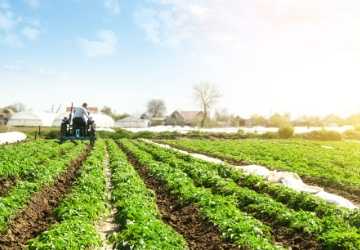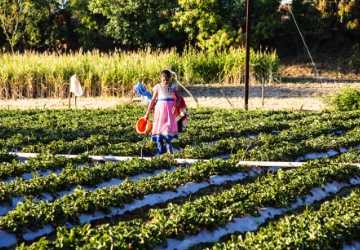Benefits of Organic Farming
Organic farming is not just about trendy labels; it's about cultivating food in harmony with nature, fostering a healthier planet for us all. From nourishing the soil to nurturing a vibrant ecosystem, organic practices create a ripple effect of positive benefits that extend far beyond your taste buds.
Organic farming is not just about trendy labels; it's about cultivating food in harmony with nature, fostering a healthier planet for us all. From nourishing the soil to nurturing a vibrant ecosystem, organic practices create a ripple effect of positive benefits that extend far beyond your taste buds.
Let’s discover some organic farming methods and techniques and how organic farming goes green to bring you the best food and the healthiest environment.
The Power of Organic Practices: Nurturing You and the Planet
So, what are the advantages of organic farming for you and the planet? Let's explore the ways organic practices can:
Keep It Clean
You won't be unknowingly ingesting those harsh pesticides and herbicides. Organic farming ditches these chemicals, potentially reducing your exposure to harmful residues.
Nutrient Powerhouse
Organic crops may pack a slightly bigger punch regarding specific vitamins and minerals Imagine, food that's not only good for you, but potentially even more nutritious!
Allergy SOS
For some folks, organic can be a game-changer. Certain farming practices can reduce allergens in some foods, making organic a potential ally for those with sensitivities.
But organic goodness goes way beyond your plate. Let's see how it benefits the Earth:
Pollution Fighters
Ditching synthetic fertilizers and pesticides means less pollution in our air and water. It's a win-win for everyone!
Happy Soil, Happy Plants
Organic farming nourishes the soil with natural goodness, improving fertility and creating a healthy ecosystem for plants to thrive.
Buzzing With Life
Organic farms become havens for bees, butterflies, and other pollinators. This explosion of biodiversity creates a thriving and balanced environment.
Water We Doing Right?
Organic practices often focus on water conservation techniques, ensuring this precious resource is used wisely.
Beyond Your Plate: The Ripple Effect and Wider Impact of Organic Farming

Did you know that organic farming goes way beyond your plate? The overall impact of organic farming cannot be overstated. This is how organic practices go beyond the grocery aisle:
Earth-Conscious Champions
Organic farmers are like environmental superheroes! They use water-saving techniques, which is impressive considering how precious this resource is.
Kicking the Fossil Fuel Habit
Synthetic fertilizers and pesticides rely heavily on fossil fuels. Organic farming cuts back on this dependence, making a positive impact on climate change.
Supporting Your Neighbors
Often, organic farms are smaller, local businesses that prioritize ethical practices. By choosing organic, you're potentially putting money back into your community and supporting sustainable livelihoods.
Farm Fresh Goodness
Organic food often travels shorter distances, meaning it arrives fresher and retains more nutrients. You might even be able to find delicious options grown right in your own backyard!
Bringing it Home: Small Steps, Big Impact
So, you are ready to join the organic revolution? Here are some ways you can make a difference right from your own kitchen:
Be a Savvy Shopper
Look for those organic certifications at the store! They're your guarantee that the food meets strict organic standards. Remember, organic might cost a bit more sometimes, but weigh the benefits against the potential drawbacks like availability.
Join the CSA Crew
Have you heard of Community-Supported Agriculture (CSA)? It's a fantastic way to connect directly with local organic farms. You sign up for a seasonal "share" of their harvest, getting a box of fresh, delicious produce delivered regularly.
Grow Your Own Green Thumb
Don't have a sprawling farm? No worries! Even a tiny balcony garden can be your organic oasis. Start small with herbs or cherry tomatoes, and enjoy the satisfaction of nurturing your own healthy farming.
Popular Organic Farming Methods
Here are some popular and clever organic farming techniques:
Crop Rotation
This method involves planting different crops in the same field over the years. This helps to improve soil fertility, reduce pest and disease problems, and fix nitrogen in the soil.
Cover Cropping
Cover crops are plants planted between cash crops or during fallow periods. They help suppress weeds, improve soil fertility, and prevent erosion.
Biological Pest Control
Biological pest control involves using natural enemies of pests to control pest populations. This can include ladybugs, praying mantises, and nematodes.
Biodynamic Farming
Biodynamic farming is an organic farming technique based on Rudolf Steiner's ideas. Biodynamic farmers believe that the healthier the soil is, the healthier the plants are, and they use various practices to promote soil health, such as applying compost teas and manure preparations.
Did You Know? Fun Facts about Organic Farming

Bee Happy
A study by the Swiss government found that organic farms support up to 50% more bee species than conventional farms. These busy pollinators are crucial for our food system, so organic farming is giving them a much-needed boost—yet another one of the great advantages of organic farming!
Carbon Champions
Organic farming practices can help fight climate change. According to the Rodale Institute, a single acre of organic farmland can store up to 7,000 pounds of carbon dioxide yearly. Imagine the impact if more farms went organic!
Global Movement
Organic farming is a global phenomenon. Over 2.8 million organic farmers are in more than 180 countries worldwide. That's a lot of people working towards a healthier planet!
Conclusion: Cultivating a Better Future, One Bite at a Time
Organic farming isn't just a fad. It's a powerful way to nourish your body and nurture the planet. We have explored the top organic farming advantages – how organic practices can lead to healthier food with fewer chemicals, a thriving environment teeming with life, and even support for local communities.
Making the switch to organic doesn't have to be overwhelming. Every informed choice you make at the grocery store, every connection you build with a local CSA, and even a small pot of organic herbs on your windowsill contribute to a healthier world. So, ditch the misconceptions and embrace the power of organic farming. It's a win for your taste buds, a win for the Earth, and a win for a brighter future for all. Remember, every bite counts!





